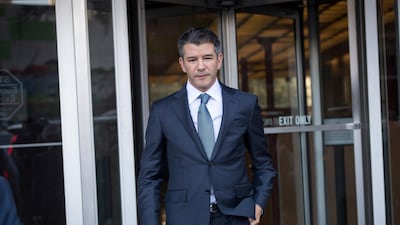Uber founder Travis Kalanick’s famously competitive nature was laid bare in a San Francisco court on Wednesday as lawyers for a rival company presented videos and text messages they said revealed a win-at-all costs mentality that drove the race to develop self-driving cars.
The jury was played a clip of Gordon Gecko’s ‘Greed is Good’ speech from the Hollywood movie Wall Street as Uber’s notorious workplace culture took centre stage during the third day of a trade secrets trial.
Mr Kalanick also described how the ride-hailing app once saw itself as the kid brother to Google in the pursuit of driverless cars but that the relationship soured, spiralling into a tense personal rivalry that eventually led to a lawsuit and trial.
Waymo, the self-driving car unit of Google’s parent company Alphabet, is suing Uber Technologies for allegedly stealing some of its technology.
The case hinges on claims that Anthony Levandowski, a former Waymo engineer, downloaded thousands of confidential files at the end of 2015, months before going to Uber.
Attorneys for Waymo argue that Uber was desperate to catch up with Google’s self-driving technology and believed that Mr Levandowski held the answer.
Charles Verhoeven, a lawyer for Waymo, introduced text messages between the pair including one in which Mr Levandowski told Mr Kalanick: “I just see this as a race and we need to win. Second place is a loser.”
Giving evidence for a second day, Mr Kalanick was asked whether he agreed with the statement and replied: “Well, I first heard it from my high school football coach, but yes.”
The text messages and emails were peppered with invitations to “jam”, go “open kimono” – an expression meaning to reveal a company’s inner workings which is considered distasteful by many executives – and “baller”, as well as a bold claim by Mr Levandowski that: “We’re going to take over the world.”
Mr Levandowski joined Google in 2007 and initially worked on mobile mapping before moving on to driverless cars. During that time he spun off a separate company that experimented with Lidar technology, using laser pulses to generate 3D maps.
He left in January 2016 to set up his own company Otto, which worked on retrofitting commercial trucks with radar, cameras and laser sensors so that they could drive themselves.
The start-up was acquired by Uber in August 2016 at a reported valuation of $680 million (Dh2.5bn).
Waymo alleges that before leaving the company, Mr Levandowksi downloaded 14,000 sensitive files on to a laptop, before transferring them to an external hard drive and wiping clean the computer, which he “inexplicably” never used again.
Court documents reveal how it took an email accident for Waymo to become suspicious that its technology may have been stolen. The company says it was copied – apparently inadvertently – into an email from a component supplier that showed an Uber Lidar circuit board which appeared similar to one of its own.
“As this email shows, Otto and Uber are currently building and deploying (or intending to deploy) Lidar systems (or system components) using Waymo’s trade secret designs,” it said in its civil complaint.
Many of the messages presented in court date to the period leading up to Uber’s acquisition of Otto.
Mr Kalanick was shown in court an email from another executive, which said the “X Factor” of acquiring Mr Levandowski’s company was the intellectual property “in their heads”.
Mr Kalanick said he did not remember the email but did not deny reading it.
In another message, Mr Levandowksi urges Mr Kalanick, who has since been ousted from Uber after a period of scandals, to watch Michael Douglas’ famous speech from Wall Street in which he declares “greed is good”.
“Greed clarifies, cuts through, and captures the essence of the evolutionary spirit,” runs the monologue that came to define rampant 1980s capitalism.
“Greed, in all of its forms – greed for life, for money, for love, knowledge – has marked the upward surge of mankind.”
Mr Kalanick also discussed his relationship with Alphabet and Larry Page, its chief executive, whom he described as a mentor. In fact, Alphabet gambled on the success of Uber, making a $258 million investment in 2013.
Things changed when Uber moved into self-driving cars, a project pursued by Alphabet since 2009, upsetting Mr Page.
“He sort of was a little angsty and said ‘Why are you doing my thing?’ and was just upset,” Mr Kalanick testified.
Uber’s acquisition of Otto prompted more serious repercussions when an Alphabet executive resigned from the company’s board, suggesting a growing level of personal bad feeling, the court heard.
Neither Mr Kalanick nor Mr Levandowski are defendants in the case, which is expected to continue through next week.

